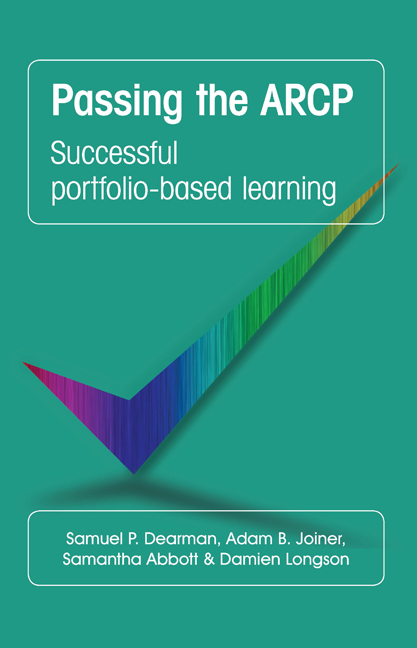Book contents
- Frontmatter
- Contents
- Authors
- List of figures
- Foreword
- Preface
- Acknowledgements
- List of abbreviations
- How to use this guide
- 1 Quick reference guide
- 2 What is a portfolio?
- 3 Lessons learned so far
- 4 Organising the portfolio
- 5 Managing your workplace-based assessments
- 6 Reflective practice and self-appraisal of learning
- 7 Audit and research
- 8 Teaching
- 9 Psychotherapy experience
- 10 Management and leadership experience
- 11 Appraisal reports, planning meetings and educational objectives
- 12 Other experiences, achievements and documents
- 13 The future of portfolios
- Index
13 - The future of portfolios
- Frontmatter
- Contents
- Authors
- List of figures
- Foreword
- Preface
- Acknowledgements
- List of abbreviations
- How to use this guide
- 1 Quick reference guide
- 2 What is a portfolio?
- 3 Lessons learned so far
- 4 Organising the portfolio
- 5 Managing your workplace-based assessments
- 6 Reflective practice and self-appraisal of learning
- 7 Audit and research
- 8 Teaching
- 9 Psychotherapy experience
- 10 Management and leadership experience
- 11 Appraisal reports, planning meetings and educational objectives
- 12 Other experiences, achievements and documents
- 13 The future of portfolios
- Index
Summary
In all likelihood, portfolios are here to stay. They provide a system to demonstrate competency and therefore public accountability. With the introduction of revalidation by the GMC, all doctors at all levels need to be appraised and portfolios are required for this (General Medical Council, 2013). Trainees’ appraisal for revalidation will take place at the ARCP panel. It is most likely that all organisations (deaneries (LETBs as of April 2013 in England), NHS trusts and private healthcare providers) will move to e-portfolios, as there are pedagogical gains as well as being easier to administrate (Strivens et al, 2009). The case is put forward that a wellmaintained portfolio will ensure public accountability (Ingrassia, 2013).
Keeping a portfolio may help doctors identify areas of interest and keep a ‘portfolio career’. This may increase job satisfaction and reduce burnout if doctors take on interests such as management, medical education, research, medico-legal work or even media, business, humanitarian aid or health policy. This will also reduce absence through sickness and increase productivity (Pathiraja & Wilson, 2011).
Medical Royal Colleges, deaneries or schools (i.e. specialties) within deaneries may have designed a portfolio which is being used. Some trainees may get frustrated with it, or identify ways to improve it without necessarily being able to influence change. There is no consistency, either between portfolios or deaneries/LETBs, so expectations can be different. The future may be a standardised portfolio (which would make writing guides such as this easier) or even a fluid, ever-evolving portfolio which is an open source so that trainees and educationalists in deaneries can modify it. This has the benefit of the potential for majority rule. An open-source portfolio has been proposed and is in its embryonic stages at the time of writing (see http://oportfol.io).
The BMJ have made a portfolio app, which allows the user to document clinical encounters and e-learning. However, it does not yet integrate with the portfolio which this book describes in detail. Integration of e-portofolios with apps is beginning to take place in non-medical areas, for example: https://sites.google.com/site/eportfolioapps/.
Twitter is being used as a platform for collaborating and troubleshooting the foundation doctor e-portofolio. This allows the flow of ideas and the potential to gain national consensus to drive up consistency and standards (e.g. https://twitter.com/NESePortfolio). There is an app available for use with this portfolio (https://app.nhseportfolios.org/app), but access requires a password so we could not assess its functionality.
- Type
- Chapter
- Information
- Passing the ARCPSuccessful Portfolio-Based Learning, pp. 61 - 62Publisher: Royal College of PsychiatristsFirst published in: 2017



